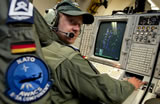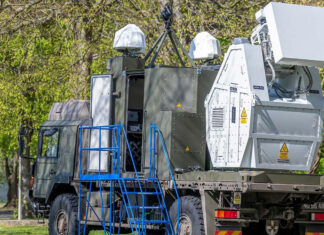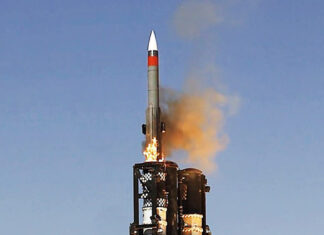A major upgrade for the mission systems of the first Airborne Warning and Control System (AWACS) aircraft operated by NATO was recently completed by EADS, Boeing. The upgrade is part of a $1.32 billion Mid-Term Modernization Program. The entire fleet of 17 AWACS aircraft, based in Geilenkirchen, Germany, are scheduled to complete the upgrade program in 2008.
The enhancements provide the AWACS crew to receive and integrate data from various sensors on board, as well as from remote sources. Multi-sensor integration also improves the reliability and accuracy of target tracks and identification and eases operator workload. New situation display consoles with flat-panel displays offering a Windows-like environment, a new mission computing system based on open architecture, which offers more economical and frequent upgrades to the hardware and software. The enhanced system can handle more targets, and offers improved interoperability with other AWACS platforms as well as with fighter aircraft, ground stations, ships and satellites.
 The aircraft is equipped with new digital communications systems, improving operator’s access and utilization of radio links. The aircraft is fitted with an improved over-the-horizon communication via satellite links. To improve connectivity with Eastern European nations’ air and ground forces, broad-spectrum VHF radios and modified identification friend or foe (IFF) system compatible are used, to meet emerging international air traffic control systems requirements. The upgraded NATO AWACS aircraft will be able to receive mission orders from remote locations and updates via satellite data links and electronically integrate them via the mission computing system.
The aircraft is equipped with new digital communications systems, improving operator’s access and utilization of radio links. The aircraft is fitted with an improved over-the-horizon communication via satellite links. To improve connectivity with Eastern European nations’ air and ground forces, broad-spectrum VHF radios and modified identification friend or foe (IFF) system compatible are used, to meet emerging international air traffic control systems requirements. The upgraded NATO AWACS aircraft will be able to receive mission orders from remote locations and updates via satellite data links and electronically integrate them via the mission computing system.
NATO’s fleet of NE-3A AWACS aircraft will be equipped with Northrop Grumman’s AN/AAQ-24(V) Large Aircraft Infrared Countermeasures (LAIRCM) laser based missile protection system, under a US$104 million program recently awarded by the US Air Force.




















